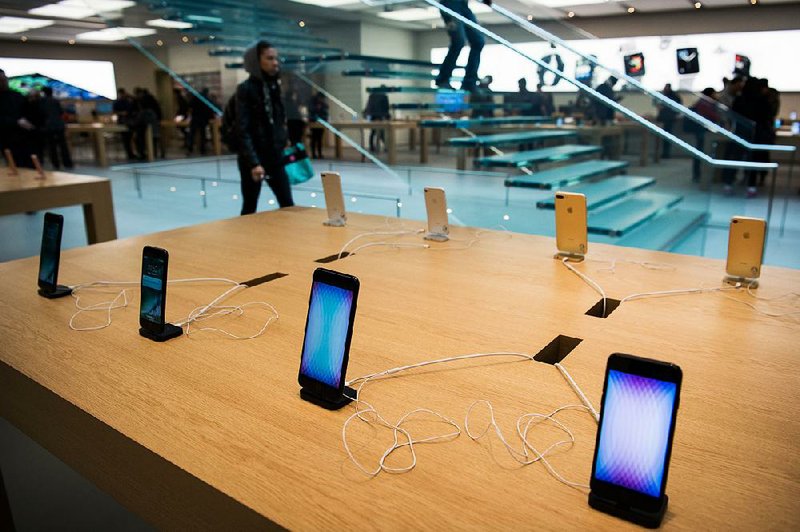SAN JOSE, Calif. -- That shiny new iPhone may say "assembled in China" on the back but its origins are scattered around the world: wafers from Taiwan, modem chips and batteries from South Korea, displays from Japan, components from Europe and raw materials from Africa, Asia, Europe and the U.S.
That complicated supply chain will put Apple -- the world's most valuable company -- and other similar U.S. companies in the bull's-eye as President Donald Trump and congressional Republicans consider sweeping import tariffs or a comprehensive border tax on incoming products, components and raw materials.
But while Apple has been singled out by Trump before, the administration's actions would affect a who's who of Silicon Valley's big name tech companies -- which could see sales, revenue and access to global talent take a hit from new fees and the trade wars that could follow.
"It's a real mess," said Marcus Noland, senior vice president at the Peterson Institute for International Economics, a Washington, D.C., think tank that supports free trade.
Only two months into the Trump administration, it's difficult to discern how an import tariff or border tax might take shape, but the president has said he wants to punish U.S. companies that make goods overseas to sell back home. Imposing new costs on imports would encourage domestic manufacturing and create jobs, Trump has argued.
While campaigning, Trump mentioned a 45 percent import tariff on goods from China and 35 percent on imports from Mexico. More recent reports suggested the Trump transition team was looking at a 10 percent fee. House Republicans, meanwhile, have proposed a 20 percent "border adjustment tax" covering all imports from all countries.
The list of firms with the most to lose from an aggressive new tariff or tax regime includes the valley's biggest names: Google, Tesla, Oracle, HP, Cisco, Intel, Seagate, Western Digital, Nvidia, Marvell Semiconductor and more.
Also standing to lose? Consumers who will inevitably have the increased costs from import tariffs or a tax passed on to them, according to experts.
"You and I are going to pay for it," said Georgia Tech professor John Vande Vate, who studies supply chains.
However, others believe imposing higher import costs would deliver significant benefits.
Northwestern University law professor Steven Calabresi said the proposed 20 percent border adjustment tax would "encourage Americans to buy American products" and "promote good jobs here in the United States" while raising $1 trillion over 10 years.
"It will allow us to cut income taxes, which discourage people from working. It is smart to discourage a little bit of the buying of foreign goods if you can then cut income taxes and get people back into the workplace or get them to work harder," he wrote last week in an opinion article on political website The Hill.
Still, tariffs or a tax would also hit countries such as China that export to the U.S., potentially leading to trade wars with nations whose markets and raw materials are critical to tech companies.
"If we decide to impose tariffs or high barriers to trade on our trading partners, we should expect reciprocal trade barriers, which of course is not good for our industries, it's not good for prices, and the whole thing spirals downward," said Renee Bowen, a Stanford University Graduate School of Business professor who studies international trade.
Generally, when tariffs drive prices up, sales go down, said Rob Atkinson, president of the Information Technology & Innovation Foundation, a tech-focused think tank.
The tech industry has long depended on a complex global network of suppliers, workers and materials. Apple, for example, noted in its most recent quarterly report that its manufacturing is concentrated among a small number of suppliers in Asia.
"Everything that is in our products comes from overseas," Hewlett Packard Enterprise Chief Executive Officer Meg Whitman told CNBC in February. "That supply chain has taken 30 years to set up. So when all those components come in and are taxed, it's not going to be good. This does not create jobs. It actually lowers the number of jobs for many, many companies."
HP Inc. makes printers and personal computers in China, while Cisco, Seagate and Western Digital manufacture products there and in Thailand, according to analyst Handel Jones of International Business Strategies in Los Gatos, Calif.
Google's new Pixel phones are made by HTC in Taiwan, where Nvidia and Marvell Semiconductor buy chips that power products sold in the U.S. The Home virtual-assistance device by Google is made in China, and the company relies on Taiwanese firm Quanta to supply the servers that make it a cloud-services titan. Facebook also buys servers from Quanta, according to analysis firm Moor Insights & Strategy. Intel has fabrication and assembly plants in China and assembly facilities in Malaysia and Vietnam.
Business on 03/10/2017
